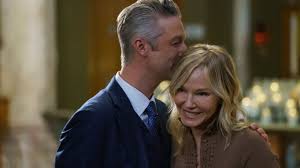
The Resonance of Rightness: Kelli Giddish and the Shifting Sands of Storytelling
In the often tumultuous and ever-evolving landscape of Hollywood, a simple statement can sometimes carry the weight of profound change. When Kelli Giddish, beloved for her portrayal of Detective Amanda Rollins on Law & Order: SVU, declared that her return to the show under its first female showrunner “feels so right,” she articulated more than just personal satisfaction. Her words, seemingly straightforward, illuminate the intricate dance between representation, empathy, and the deep-seated yearning for authenticity that now permeates the creative industries. It’s a declaration that speaks to the power of alignment – where professional opportunity converges with a sense of innate justice and understanding.
To grasp the full resonance of Giddish’s statement, one must first consider the context of her journey. For years, she anchored a pivotal role on a show that grapples daily with the raw edges of human vulnerability and the often-gendered nature of crime. Her departure from SVU was met with widespread fan disappointment, marking the end of an era for a character who had navigated trauma, motherhood, and professional evolution with gritty realism. A return, in itself, is a significant event – a character’s resurrection, a second act. But for Giddish, this wasn’t merely about reprising a role; it was about stepping back into a narrative crafted under a leadership that felt instinctively, perhaps even viscerally, right.
The pivotal phrase, of course, is “first female showrunner.” In an industry historically dominated by male voices, particularly in positions of ultimate creative control, a woman at the helm is still, regrettably, a notable milestone. Showrunners are the architects of narratives, the ultimate decision-makers who shape character arcs, thematic direction, and the very tone of a series. For a show like SVU, which delves into the sensitive and often harrowing experiences of victims, the perspective of its leader is paramount. A female showrunner brings not just a different management style, but a lived experience, a unique lens through which to view and interpret the stories of largely female victims and the complexities of gendered violence. This isn’t to say male showrunners are incapable, but rather to acknowledge the richness and nuance that an alternative viewpoint can inherently provide.
When Giddish says this “feels so right,” she is tapping into an unseen current that runs beneath the surface of professional life. It’s a feeling that often arises from a sense of shared understanding, a quiet validation of one’s own experience reflected in the person in power. For a female actor who has spent years embodying the struggles and triumphs of a complex woman, working under a female showrunner can bring an unparalleled sense of safety, collaboration, and authentic interpretation. It suggests a space where the unspoken nuances of female experience – the subtle power dynamics, the emotional resilience, the specific anxieties – might be instinctively grasped and meticulously translated onto the screen.
This “rightness” could manifest in myriad ways: a script note that sharpens a character’s emotional truth, a directorial choice that empowers a female storyline, or simply a set environment where empathy is the bedrock. It speaks to a subtle shift from merely performing a role to co-creating it within a framework of profound resonance. For Giddish, who has poured years into Rollins, this alignment might feel like an affirmation that her character’s continued journey will be guided by someone who genuinely understands the weight and grace required.
Beyond the personal and professional sphere of Kelli Giddish, her statement echoes a broader cultural movement. It’s a testament to the slow but steady chipping away at glass ceilings, a celebration of the fact that talent and leadership are finally being recognized across the gender spectrum. It reminds us that representation in positions of power isn’t just about optics; it’s about profoundly enriching the stories we tell, making them more authentic, more empathetic, and ultimately, more universally resonant.
Kelli Giddish’s simple declaration is a beacon. It illustrates the quiet power of feeling truly seen and understood in one’s profession, and the transformative impact of diverse leadership. It’s a vivid snapshot of a moment where creative endeavor, personal satisfaction, and societal progress converge, proving that sometimes, the most powerful statements are those that articulate not just what is happening, but what, at long last, “feels so right.”
